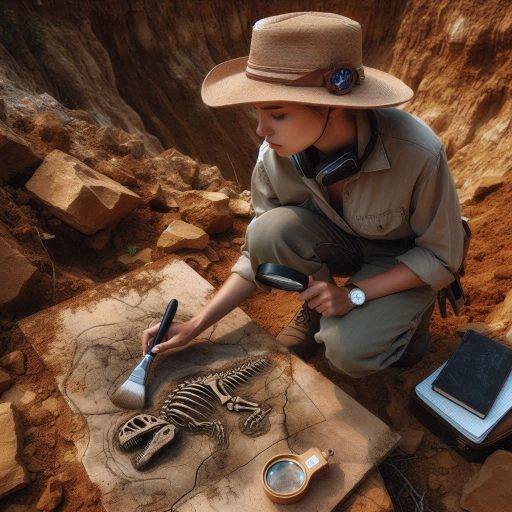Introduction
Interviews play a crucial role in the job search process for pharmacology job seekers.
They offer candidates a chance to demonstrate their skills and knowledge.
In this competitive field, standing out during interviews is essential.
Employers look for candidates who not only have the necessary qualifications but also align with their company culture.
The pharmacology industry is constantly evolving, requiring professionals to stay updated on the latest developments.
Job seekers must showcase their expertise and adaptability to impress hiring managers.
A successful interview can make a significant difference in securing a position.
It allows candidates to highlight their relevant experience and convey their passion for pharmacology.
Additionally, effective communication skills can set candidates apart from others.
Preparation is key to feeling confident and making a positive impression.
Pharmacology job seekers should focus on presenting themselves professionally and articulating their thoughts clearly.
By approaching interviews with the right mindset and strategies, candidates can increase their chances of success.
Ultimately, interviews are an opportunity to demonstrate your unique qualifications and enthusiasm for a career in pharmacology.
Research the Company
Researching the company before an interview is essential for pharmacology job seekers.
Understanding the company‘s values, mission, and culture sets you apart from other candidates.
It demonstrates your genuine interest in the position and organization.
Understand Their Values, Mission, and Culture
Begin your research by visiting the company‘s official website.
Look for sections like “About Us” and “Careers.”
These areas often highlight the company‘s core values and mission statement.
Pay attention to how they describe their approach to patient care, innovation, and community involvement.
Next, explore the company‘s presence on social media.
Platforms like LinkedIn and Twitter can provide insights into their current projects and initiatives.
Engage with their posts to get a sense of their communication style and priorities.
You can also read recent news articles or press releases about the company.
These resources may inform you about significant developments, product launches, or industry partnerships.
Understanding these aspects will help you discuss relevant topics during your interview.
Tailor Your Responses to Show Alignment
Once you gather information, think about how it aligns with your own values and experiences.
Identify key points that resonate with you and consider how you can incorporate them into your responses.
Tailoring your answers to reflect the company‘s mission will show your commitment to their goals.
During the interview, refer to specific company values in your responses.
For example, if the company prioritizes innovation, discuss your experiences with new drug development or research methodologies.
This approach highlights your suitability for the role and your alignment with their culture.
Also, prepare questions that reflect your research.
Ask about the company‘s future projects or initiatives related to their mission.
This demonstrates your interest and enthusiasm for the position.
Thoughtful questions can set you apart from candidates who only focus on generic inquiries.
Moreover, consider how the company‘s culture fits your working style.
If they emphasize teamwork, share examples of successful collaborations you have had.
Highlighting your compatibility with their culture will make you a more attractive candidate.
Lastly, remember that research is an ongoing process.
Stay updated on any changes within the company or industry trends before your interview day.
This knowledge can help you adjust your responses if needed.
Researching the company is a critical step in preparing for a pharmacology job interview.
It allows you to align your responses with their values, mission, and culture.
By demonstrating your knowledge and interest, you increase your chances of making a positive impression.
Investing time in research can ultimately enhance your overall interview performance.
Review Common Interview Questions
Familiarize Yourself with Common Interview Questions Typically Asked in Pharmacology Job Interviews
Familiarizing yourself with common interview questions is crucial for pharmacology job seekers.
Understanding these questions prepares you for the interview and boosts your confidence.
Practicing your responses also helps you articulate your thoughts clearly during the interview.
Start by researching typical questions asked in pharmacology job interviews.
Many questions focus on your technical skills, experiences, and problem-solving abilities.
Common questions include inquiries about your background, educational qualifications, and specific experiences in pharmacology.
For example, interviewers often ask, ‘What inspired you to pursue a career in pharmacology?‘
Prepare a concise response that highlights your motivation and passion for the field.
Another frequently asked question is, ‘Can you describe a challenging project you worked on?‘
Use the STAR method to structure your response.
Describe the Situation, Task, Action, and Result.
This approach helps you present a comprehensive and compelling answer.
Focus on showcasing your critical thinking, teamwork, and problem-solving skills.
You should also prepare for questions related to drug development and patient care.
Interviewers may ask, ‘How do you stay updated on the latest advancements in pharmacology?‘
Share your strategies for continuous learning, such as attending conferences, enrolling in online courses, or reading industry journals.
This response demonstrates your commitment to staying informed and improving your skills.
Technical questions can also arise during the interview.
For instance, you might be asked about specific drug interactions or pharmacokinetics.
Review relevant topics and concepts to ensure you can answer confidently.
Being well-prepared for these questions showcases your expertise and readiness for the role.
Additionally, expect behavioral questions that assess your soft skills.
An example is, ‘How do you handle conflicts with team members?‘ Reflect on your past experiences and share specific examples of conflict resolution.
Highlight your ability to communicate effectively, empathize with others, and find common ground.
Practice Your Responses to These Questions to Feel More Confident and Prepared During the Interview
To enhance your preparation, conduct mock interviews with a friend or mentor.
This practice allows you to rehearse your responses and receive feedback.
Aim for clear, concise answers that directly address the questions.
Mock interviews also help you practice maintaining eye contact and positive body language, both crucial during actual interviews.
Another helpful tip is to create a list of questions you want to ask the interviewer.
This shows your interest in the company and position.
Questions might include inquiries about team dynamics, ongoing projects, or opportunities for professional development.
Engaging in a two-way conversation demonstrates your enthusiasm and proactive nature.
Finally, remember to stay calm and composed during the interview.
Take deep breaths and listen carefully to each question.
If you don‘t understand a question, don‘t hesitate to ask for clarification.
Being well-prepared and adaptable will help you navigate the interview successfully.
Reviewing common interview questions is vital for pharmacology job seekers.
Familiarize yourself with technical, behavioral, and situational questions.
Practice your responses to feel more confident and prepared for your interview.
Read: How Climate Change Is Impacting Plant Research
Highlight Relevant Experience
Showcase Your Relevant Experience and Skills That Align With the Job Requirements
Highlighting your relevant experience is crucial when interviewing for a pharmacology position.
Start by thoroughly reviewing the job description.
Identify key skills and qualifications the employer seeks.
This will help you tailor your responses effectively.
Begin your interview by summarizing your educational background and relevant work experience.
Focus on degrees, certifications, and internships related to pharmacology.
Mention any specific coursework or projects that provided practical skills.
For example, if you completed a project on drug formulation, emphasize its relevance to the role.
Next, discuss any previous positions you have held in the field.
Detail your job responsibilities and achievements.
Use concrete numbers and examples to showcase your impact.
For instance, state how you improved a drug’s efficacy through research or analysis.
This quantifiable evidence strengthens your case and demonstrates your capabilities.
Emphasize any technical skills you possess that align with the job requirements.
Familiarity with laboratory techniques, analytical methods, or regulatory guidelines can be highly relevant.
Make sure to mention any software or tools you have used, such as statistical analysis programs or database management systems.
Additionally, focus on any teamwork or collaborative experiences.
Pharmacology often involves working with multidisciplinary teams.
Share examples of how you successfully collaborated with scientists, healthcare professionals, or regulatory bodies.
Highlight your ability to communicate effectively, share ideas, and contribute to group success.
Specific Examples of How Your Past Experiences Have Prepared You for the Position
Specific examples will enhance your narrative and make your experiences relatable.
Use the STAR method (Situation, Task, Action, Result) to structure your responses.
This technique helps you clearly articulate your contributions and outcomes.
For instance, if you worked on a clinical trial, describe the situation.
Explain your role in the trial, the tasks you performed, and the actions you took.
Finally, highlight the results, such as improved patient outcomes or successful data collection.
This method illustrates your problem-solving skills and ability to deliver results under pressure.
Another example might involve a time when you identified a potential drug interaction.
Describe the situation, the analysis you conducted, and the actions you took to address it.
Highlight the outcome, such as preventing adverse effects or improving patient safety.
This showcases your attention to detail and commitment to patient care.
Be prepared to discuss any challenges you faced in previous roles.
Employers appreciate candidates who can learn from their experiences.
Share how you overcame obstacles, adapted to changing circumstances, or improved processes.
This demonstrates resilience and a proactive approach to problem-solving.
Highlighting relevant experience is essential during interviews.
Showcase your skills and provide specific examples that align with the job requirements.
Use the STAR method to structure your responses effectively.
This preparation will help you make a strong impression and enhance your chances of success.
Read: Exploring the Different Branches of Geology
Discuss Your Pharmacology Knowledge
Be Prepared to Discuss Your Knowledge of Pharmacology and Any Recent Developments in the Field
When interviewing for a pharmacology position, be ready to discuss your knowledge of the field.
Stay updated on recent developments, including new drugs and treatment methodologies.
Familiarize yourself with breakthrough research and innovations.
This knowledge demonstrates your passion for pharmacology and commitment to ongoing learning.
Review recent publications and scientific journals to identify emerging trends.
Focus on topics such as drug safety, efficacy, and regulatory changes.
Highlight specific examples of new medications or therapies that interest you.
For instance, discuss the impact of biologics or personalized medicine on patient treatment options.
Showing awareness of these developments can impress interviewers.
Consider the implications of recent advancements on patient care and outcomes.
Be prepared to explain how these changes influence pharmacological practices.
For example, if discussing gene therapy, mention its potential to revolutionize treatment for genetic disorders.
This shows that you can connect theory with real-world applications.
Demonstrate Your Understanding of Key Concepts and Your Ability to Apply Them in a Practical Setting
In addition to discussing recent developments, demonstrate your grasp of fundamental pharmacology concepts.
Review essential topics, such as pharmacokinetics, pharmacodynamics, and drug interactions.
Be ready to explain these concepts clearly and concisely.
Use examples from your education or experience to illustrate your understanding.
For example, when discussing pharmacokinetics, explain absorption, distribution, metabolism, and excretion (ADME).
Use a specific drug as an example to illustrate these principles.
This helps interviewers see your ability to apply theoretical knowledge to practical situations.
You should also discuss the significance of evidence-based practice in pharmacology.
Explain how research informs clinical decision-making and enhances patient care.
Be prepared to reference recent guidelines or studies that impact pharmacological practices.
This shows your commitment to using the best available evidence in your work.
Additionally, consider discussing case studies from your academic or professional experience.
Describe scenarios where your pharmacology knowledge influenced treatment decisions.
Explain how you analyzed the situation, evaluated options, and recommended a course of action.
This showcases your critical thinking and problem-solving skills.
Furthermore, prepare to discuss ethical considerations in pharmacology.
Highlight the importance of patient safety and informed consent.
Be ready to explain how you would navigate ethical dilemmas in your practice.
This demonstrates your awareness of the broader implications of your work.
Finally, practice articulating your knowledge and insights confidently.
Interviewers appreciate candidates who can communicate complex ideas clearly.
Use simple language and avoid jargon, ensuring your responses are understandable.
Discussing your pharmacology knowledge is essential during interviews.
Stay updated on recent developments and understand key concepts.
Prepare to connect theoretical knowledge with practical applications.
This preparation will enhance your credibility and increase your chances of securing the position.
Read: Top Skills Needed for a Successful Geology Career

Communication Skills
Highlighting‘Your Communication Skills, Including the Ability to Effectively Communicate Complex Information to Diverse Audiences
Effective communication is vital in pharmacology.
You must convey complex information clearly to various audiences.
This includes colleagues, patients, and healthcare professionals.
During your interview, emphasize your ability to adapt your communication style to suit different audiences.
Start by discussing your experience in simplifying complex concepts.
Explain how you translate scientific jargon into layman’s terms.
Use specific examples from your experience.
For instance, share a time when you educated a patient about their medication.
Highlight how you ensured they understood the dosage and potential side effects.
This demonstrates your commitment to patient safety and education.
Also, mention your experience in presenting information to colleagues.
Discuss instances where you led training sessions or workshops.
Explain how you tailored your presentations to engage your audience.
Use visuals or interactive elements to enhance understanding.
This shows that you can effectively communicate in professional settings.
Examples of How You Have Successfully Communicated with Colleagues, Patients, or Clients in the Past
In addition to presenting, discuss your collaboration with colleagues.
Provide examples of successful teamwork where effective communication was key.
Share a specific project where you facilitated discussions among team members.
Explain how you ensured everyone‘s ideas were heard and valued.
This reflects your ability to foster a collaborative work environment.
You can also highlight your communication skills through written documentation.
Mention your experience writing reports, protocols, or patient education materials.
Discuss how you ensure clarity and precision in your writing.
Provide an example of a document you created that received positive feedback.
This showcases your attention to detail and ability to convey information accurately.
Discuss your experience with patients and their families as well.
Explain how you build rapport and trust through open communication.
Share an example of a challenging conversation you had.
Describe how you navigated sensitive topics, such as medication adherence or side effects.
This demonstrates your empathy and professionalism in patient interactions.
Additionally, emphasize your active listening skills.
Explain how you listen to patients’ concerns and questions.
Describe how this approach helps you address their needs effectively.
Active listening fosters strong relationships and improves patient outcomes.
Finally, prepare to discuss your communication skills in the context of technology.
Highlight your proficiency with telehealth platforms or electronic health records.
Explain how you utilize these tools to enhance communication with patients and healthcare teams.
This shows your adaptability in a rapidly changing environment.
Emphasizing your communication skills during interviews is crucial.
Highlight your ability to convey complex information clearly.
Provide examples from your past experiences that demonstrate your effectiveness.
This preparation will help you stand out as a strong candidate for the position.
Read: The Future of Botany: Emerging Fields and Innovations
Transform Your Career Today
Unlock a personalized career strategy that drives real results. Get tailored advice and a roadmap designed just for you.
Start NowGain More Insights: Space Science Projects You Can Participate In
Ask Thoughtful Questions
Prepare a List of Thoughtful Questions to Ask the Interviewer to Demonstrate Your Interest in the Position and the Company
Asking thoughtful questions during an interview shows your genuine interest in the position.
Prepare a list of questions that demonstrate your knowledge about the company.
Tailor your questions to the specific role you are applying for.
This preparation helps you stand out from other candidates.
Begin by researching the company‘s recent developments.
For example, inquire about new projects or initiatives the company is pursuing.
Ask how these initiatives align with the company’s overall mission.
This shows that you are engaged and informed about their current activities.
Additionally, ask about the team you would be joining.
Inquire about the dynamics within the team and their collaboration methods.
This question demonstrates your interest in teamwork and workplace culture.
Understanding team dynamics helps you assess if you would be a good fit.
You can also ask about the opportunities for professional development within the company.
Inquire about mentorship programs or continuing education support.
This shows that you value growth and learning.
It also indicates that you are looking for a long-term commitment.
Avoid Asking Questions That Can Easily Be Found on the Company’s Website or Through a Simple Google Search
Avoid asking questions that have straightforward answers available online.
Steer clear of questions about the company’s mission statement, founding date, or general services.
This information is easily accessible and suggests a lack of preparation.
Instead, focus on questions that require deeper insight.
For example, ask about the challenges the team currently faces.
This shows your desire to contribute meaningfully from day one.
It also provides insight into the company’s priorities and potential obstacles.
Another insightful question involves the company‘s approach to innovation.
Ask how they stay ahead in a rapidly changing market.
This demonstrates your understanding of the industry’s competitive landscape and your proactive mindset.
Inquire about the company culture as well.
Ask how the company fosters diversity and inclusion within the workplace.
This question reflects your values and interest in a positive work environment.
Understanding the company culture helps you gauge your fit within the organization.
Finally, consider asking about the evaluation process for success in the role.
Inquire how performance metrics are established and measured.
This question shows your commitment to achieving results and contributing to the company‘s goals.
Asking thoughtful questions is crucial during an interview.
Prepare questions that reflect your interest in the position and the company.
Avoid simple questions with easily accessible answers.
Instead, focus on deeper inquiries that show your understanding of the company’s values and goals.
This strategy will enhance your interview experience and demonstrate your commitment to the role.
Dress Appropriately
Dress Professionally and Appropriately for the Interview, Taking Into Account the Company’s Dress Code and Industry Norms
Dressing appropriately for an interview is crucial for making a positive first impression.
Research the company’s dress code before the interview.
Look for clues on the company‘s website, social media, and employee profiles.
Consider the industry norms as well.
A pharmaceutical company might expect formal attire, while a tech startup may favor smart casual.
When in doubt, opt for professional attire.
A well-fitted suit or dress conveys seriousness and respect.
For men, a suit, dress shirt, and tie work well.
Women can choose a professional dress or a suit with a blouse.
Neutral colors like navy, gray, and black are safe choices.
These colors project professionalism and confidence.
Additionally, consider the season and location.
In summer, lighter fabrics are appropriate.
In colder months, layering can add warmth while maintaining professionalism.
Always ensure your outfit aligns with the overall company culture.
Ensure That Your Attire Is Clean, Neat, and Reflects a Polished Professional Image
Your appearance should reflect a polished professional image.
Ensure your clothes are clean and wrinkle-free.
Inspect your outfit for stains or damage.
A neat appearance demonstrates attention to detail and respect for the interview process.
Take time to groom yourself properly.
Pay attention to personal hygiene and grooming.
A fresh haircut or tidy hairstyle shows professionalism.
Keep nails trimmed and clean, and ensure any makeup is appropriate for the workplace.
Avoid excessive jewelry or flashy accessories, which can distract from your qualifications.
Footwear also plays a crucial role in your overall appearance.
Choose polished shoes that complement your outfit.
Men should wear dress shoes, while women may opt for closed-toe flats or heels.
Ensure that your shoes are comfortable, as you may need to walk or stand during the interview.
Consider the impact of your attire on your confidence.
Wearing professional clothing can boost your self-esteem.
When you feel good in your outfit, you are more likely to project confidence during the interview.
Confidence can significantly affect your performance and how interviewers perceive you.
Finally, be mindful of body language during the interview.
Sit up straight and maintain eye contact.
A confident posture complements your professional appearance.
Engage with the interviewer while conveying enthusiasm for the position.
Dressing appropriately for an interview is essential.
Research the company’s dress code and industry standards.
Choose professional attire that reflects your personality while aligning with company culture.
Ensure your outfit is clean and polished, and pay attention to grooming.
A well-considered appearance will help you make a strong first impression and enhance your confidence during the interview process.
Conclusion
Preparation and professionalism are crucial for success in pharmacology job interviews.
Researching the company helps you align your responses with their values.
Familiarizing yourself with common interview questions boosts your confidence and readiness.
Highlighting relevant experience showcases your qualifications and makes you a strong candidate.
Demonstrating your pharmacology knowledge shows your commitment to the field.
Emphasizing communication skills allows you to convey complex information clearly and effectively.
Asking thoughtful questions demonstrates your genuine interest in the position and company.
Dressing appropriately reflects your professionalism and attention to detail.
By following these tips, you can make a strong impression during your next job interview.
Proper preparation enhances your chances of success and sets you apart from other candidates.
Remember, every interview is an opportunity to learn and grow.
Approach each one with enthusiasm and confidence.
You have the skills and knowledge to excel in the field of pharmacology.
Use these strategies to showcase your strengths and secure your desired position.
Good luck on your job search journey!




